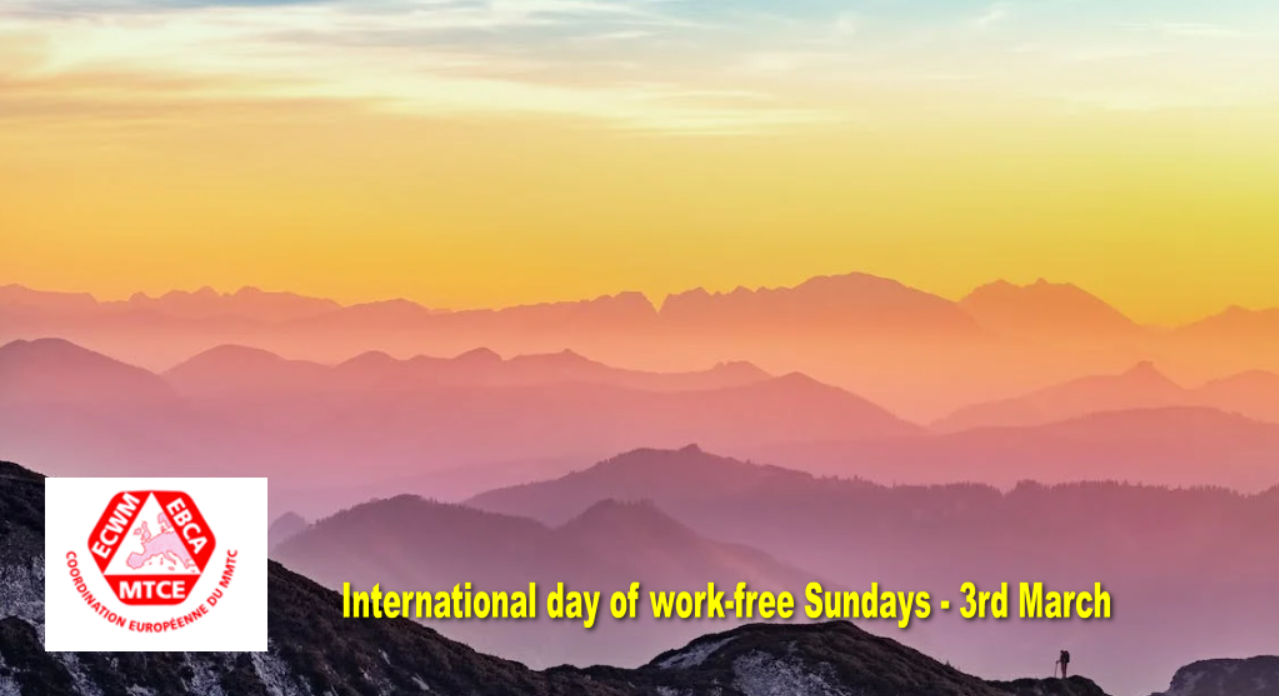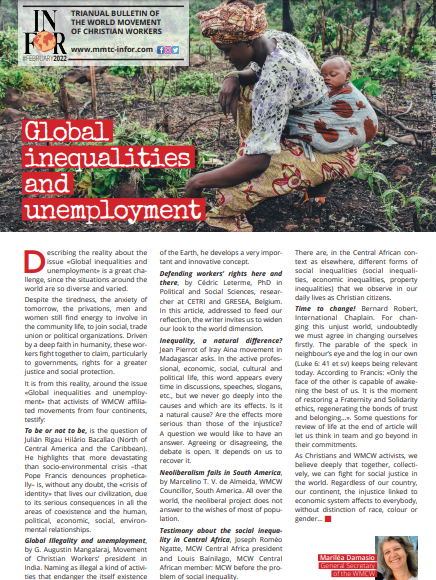
The separation between working time and leisure time has been decreasing. On average, workers' leisure time has lost importance. We live in a time of the primacy of capital over labour. Our principles are based on the primacy of the person over material things. The economy, business and work must serve people, not the other way around i.e. "work for the person, not the person for work". This is the meaning of the traditional principle of the primacy of labour over capital (see Laborem Exercens, 7 and 13).
March 3rd is Work Free Sunday. On this day we reflect seriously about these questions: Do we really need shops to be open all weekend including Sunday? As consumers, isn't there another day in the week to go shopping? Apart from strictly necessary activities, is it really necessary to work on Sunday? As a society should we set aside a day in the week where most citizens are free from work and more value is placed on rest, free time, leisure, creating more time for the family and their well-being?
In the organisation of work, the duration of working time in most developed economies took a long time to be understood and regulated. For many centuries people worked from sunrise to sunset.
The workers' struggles of the 19th and 20th centuries made it possible to establish a general limit of 8 hours a day, 5 days a week, in most sectors of work in western countries. During the 1990s, with the introduction of new technologies, it was believed that it was possible to reduce working hours and that workers would have more free time, a hope that did not come true.
Precisely at that time, new legislation indiscriminately authorised Sunday work. In some European countries, like Portugal, this measure was presented as something inevitable and that followed the model of other European countries as it would create more facilities for shopping, increase its volume and create more jobs. More recent studies show that this did not create more jobs; the supermarkets imposed themselves and many traditional, urban and local businesses had to close down because they could not stand the competition.
Several European countries have not adopted such measures and very few shops are open on Sundays. Furthermore, it has been found that the volume of purchases has not increased with Sunday opening. Instead, the value of the purchases from other days, or from other places, has been transferred to Sunday in the large stores.
As Christian Workers' Movements we believe that Sunday work that is not about caring for people (children, young people, the elderly, families etc) or infrastructures that are essential to human life, does not make sense. The sectors that cannot stop working on Sunday should be better regulated, supervised and the workers, be better paid and compensated in rest time. "Work is an essential dimension of social life, because it is not only a way of earning bread, but also a means for personal growth, for establishing healthy relationships, expressing oneself, sharing gifts, feeling coresponsible for the world and, finally, living as a people" (see Fratelli Tutti, n. 162).
With the globalization of the economy and new consumer habits, the world of work has undergone changes in the concept of work, which has led to new ways of organizing working time, threatening and making rest time uncertain for the worker. In several situations, such as teleworking, the boundary between professional working time and free time is poorly defined and working conditions and the quality of life of the worker has worsened. As a result of fierce market competition and often inhumane working conditions in certain sectors and professions with new configurations: Low wages; irregular hours; rotating shifts at night and weekends; working in two or three different places; continuous working without companies having to pay more for it. "Making this diversity of forms of work compatible with the demands of a schedule that allows daily, weekly and annual rest, and the dignity of work and the worker, here is the great challenge!" as Cristina Rodrigues (Coimbra’s University sociologist) states.
The reality undermines the fundamental human being, "being a person", because of the continuous adaptation to new schedules and the constant mismatching of schedules, it is difficult to coincide rest times with those of the spouse or children, which undermines family harmony.
The liberalisation of Sunday trading interferes with human, social, family, cultural and religious issues and runs counter to community well-being. The lack of family conviviality and of willingness to participate in social, cultural and religious life breaks up families and society; individualises people; prevents solidarity; does not generate well-being; causes illness and makes community life difficult. A society where families do not meet, do not dialogue and hardly "know" each other has no future.
We all need to take responsibility. It is also up to consumers, to each one of us, to make choices. In a society where more and more people are mobilising around "Caring for our Common Home" minimising the consumption of superfluous things seems to be the right thing to do. Our choices have an impact on the decision-makers of companies: many commercial spaces close on Sundays and this does not mean that they lose economic viability. We need to think more about those who have to work on Sundays and all the family and social upheavals caused by mismatched schedules for family members and their social groups and friends.
The Fight for a Work Free Sunday is absolutely vital so that there can be family life for everyone, so that families and all workers can socialize and fraternize and a fairer world of solidarity can be built.
Written by LOC/MTC, Portugal, 2023.









